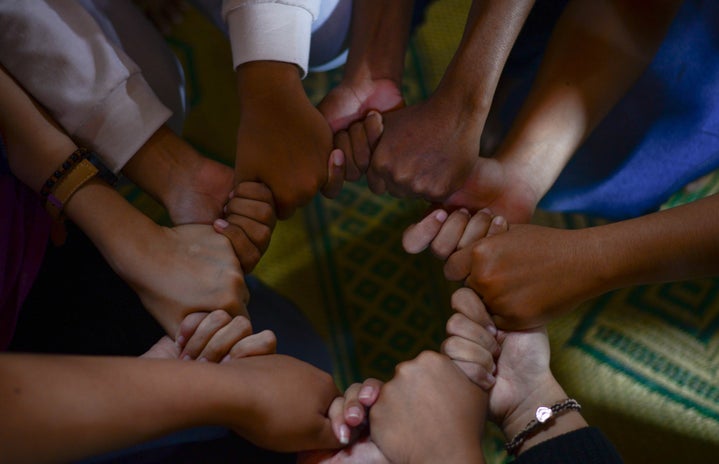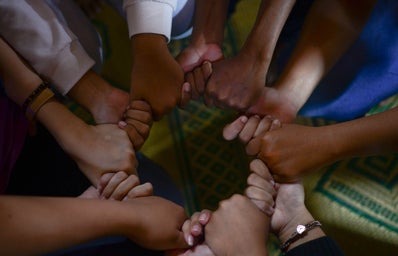Like other East-Village-near-twenty-somethings living alone for the first time, I moved to Manhattan for ‘the freedom.’
The prospect of no particular prospects. The possibilities in a new city, a new apartment and an entirely new life to go alongside them. For the first few months, the solitude was romantic: solo dates at cafés, quiet strolls with city views, window-shopping through my new stomping grounds; but once the streets were familiar, so was the sensation of loneliness. And it was lonely.
In my school community of ten thousand (and a city of nearly ten million) I felt like the only person that didn’t have things ‘figured out’ and that misconception barred me from reaching out to others for help and camaraderie when I needed it most. Everyone else just seemed so engrossed in their own work and friend circles, who was I to impose? In a city and institution that was so fiercely individual, how was I meant to make connections?
Now, nearly two years later, I feel confident in saying that I was able to ‘figure it out’ and in three acts, I will share what I found most helpful in doing so.
I. Connectivity 101: Clubs & Jobs
I recognize the cliché of ‘getting involved.’ It is the advice you’ve heard from every long-graduated relative and high-school friend thriving on a standard campus: ‘Join a club,’ ‘Get a job,’ ‘Network, network, network!’ It can be frustrating to be fed cookie-cutter solutions when the problem of connectivity is so nuanced; but as hesitant as I am to admit it, there is some value in this advice.
Sticking with the cookie-cutter metaphor, joining a club is like a pan-sized, seamless- circle-shaped cookie-cutter: it is an all-encompassing and near-universal answer to the question of making new friends in a new city. The wonder of a club is two-fold, as not only is it a prime opportunity to meet others with like interests, but it is recurring: a guarantee that any budding friendships can continue to grow, with the support of a comfortable and familiar environment.
When I first arrived at The New School, I was struck by the breadth of clubs I saw on Narwhal Nation: it was (and is) an incredible resource for browsing student-run organizations. I joined a fitness troupe in my first semester and found that I benefited a lot from the communal activity; as well as moving my body in a positive and mindful way.
Although I have made and strengthened my friendships on campus, my off-campus job has been equally as lucrative when it comes to making friendships. Working alongside others is an excellent opportunity to curate relationships over time, not unlike a club at school– with added responsibilities. It has also provided some necessary ‘breathing room’ from campus: allowing me to explore life outside of my institution and make connections that are not directly connected to my studies.
II. Commit to the bit.
Affirmation time!
You have valuable points to contribute to conversations. You are an active participant in your friendships. You are capable of improving the lives of those around you. And, more simply, you are funny!
Telling a joke is a vulnerable thing. It may feel that you are at the mercy of those around you; that your conversational worth hinges upon the laughter of your friends, but truth be told, I have never once regretted opening the door and inviting humor into a conversation (even if the joke was not received very well).
Joking around sends signals of social safety and confidence to those around you, which, in turn, draws them in. Not that the intention of joke-telling is to attract friends, per se, but it is important to recognize the positive impact that being a bit silly can have on one’s relationships. Try not to stifle a ‘bit’ before it emerges,and when it does, allow it to unfold!
III. Be aware of self-isolative tendencies.
New York City has the potential to be the most profoundly interconnected space in the country or the most isolating; with the central condition changing that experience being oneself.
If you notice you haven’t spoken or moved your body in a while, let this article be your sign. As we continue to move away from the darkest days of the pandemic, it becomes more and more important to check our self-isolative tendencies (in situations where they are not required for safety reasons!)
It is easy to remain within your comfort zone; accepting the ‘knowns’ and safety of your bedroom, as opposed to venturing out and engaging with others. It may seem silly, but it is absolutely crucial to stay aware of feelings of self-inflicted loneliness. If you feel as if you are getting in your own way, there is no shame in reaching out to someone, whether they are in New York City or not, for a hand, or a shoulder.
The world’s oyster is opening up once again, and it is yours. Don’t be afraid to lean into undiscovered clichés, step outside of your comfort zone and laugh through it all.


